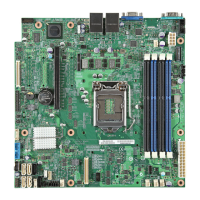Appendix D: POST Code Errors Intel® Server Board S1200V3RP TPS
Revision 1.2
DIMM_O2 encountered a Serial Presence Detection (SPD) failure
DIMM_O3 encountered a Serial Presence Detection (SPD) failure
DIMM_P1 encountered a Serial Presence Detection (SPD) failure
DIMM_P2 encountered a Serial Presence Detection (SPD) failure
DIMM_P3 encountered a Serial Presence Detection (SPD) failure
POST Reclaim of non-critical NVRAM variables
BIOS Settings are corrupted
NVRAM variable space was corrupted and has been reinitialized
Serial port component was not detected
Serial port component encountered a resource conflict error
TPM device missing or not responding.
TPM device failed self test.
PCI component encountered a SERR error
PCI Express* component encountered a PERR error
PCI Express* component encountered an SERR error
DXE Boot Service driver: Not enough memory available to shadow a Legacy
Option ROM
POST Error Beep Codes
The following table lists the POST error beep codes. Prior to system video initialization, the
BIOS uses these beep codes to inform users on error conditions. The beep code is followed by
a user-visible code on the POST Progress LEDs.
Table 77. POST Error Beep Codes
Short beep sounded whenever a USB device is discovered
in POST, or inserted or removed during runtime
Intel
®
TXT security
violation
System halted because Intel
®
Trusted Execution
Technology detected a potential violation of system
security.
System halted because a fatal error related to the memory
was detected.
Recovery boot has been initiated
BIOS recovery has failed. This typically happens so quickly
after recovery us initiated that it sounds like a 2-4 beep
code.
The Integrated BMC may generate beep codes upon detection of failure conditions. Beep codes
are sounded each time the problem is discovered, such as on each power-up attempt, but are
not sounded continuously. Codes that are common across all Intel
®
server boards and systems
that use same generation chipset are listed in the following table. Each digit in the code is
represented by a sequence of beeps whose count is equal to the digit.

